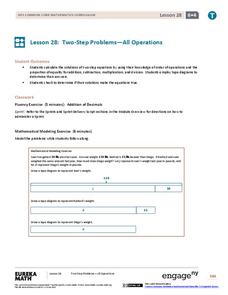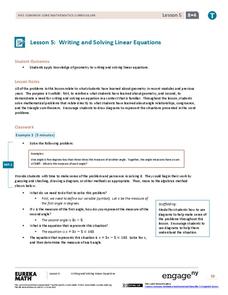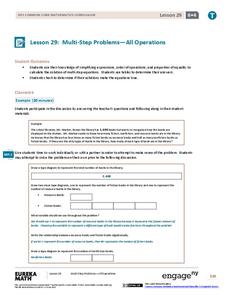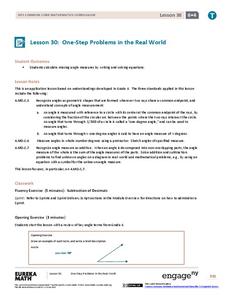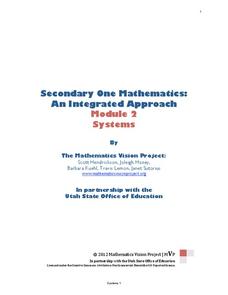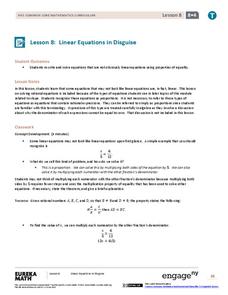Overcoming Obstacles
Problem Solving at Home
The final lesson in the "Problem Solving Module" focuses on finding creative solutions to problems that might arise at home. Individuals then create a storyboard that illustrates how they would apply the six-step problem-solving process...
Missouri Department of Elementary
The Problem Solving Game
Creativity, communication, cooperation. Pupils assume the role of employees at a game factory working together to develop a new game. Using the principles of the STAR method (Stop, Think, Act, Review), they work in teams to create game...
Overcoming Obstacles
Problem Solving on the Job
The truth is there are consequences for actions. The third lesson in the "Problem Solving Module" asks class members to brainstorm a list of problems, select one and invent a system, process, or object that might solve the problem. They...
EngageNY
Problem Solving and the Coordinate Plane
Class members investigate rectangles on the coordinate plane. They determine the length of line segments in the coordinate plane with the same x-coordinate or same y-coordinate and then solve geometric problems involving perimeter...
EngageNY
Two-Step Problems—All Operations
Step 1: Use the resource. Step 2: Watch your class become experts in solving two-step problems. Scholars learn to solve two-step word problems in context. They use tape diagrams and algebraic techniques to break the problem into two,...
EngageNY
Writing and Solving Linear Equations
Incorporate geometry into the solving linear equations lesson plan. Pupils use their knowledge of geometry to write linear equations which reinforces geometry measurement concepts while at the same time providing a familiar context...
EngageNY
Multi-Step Problems—All Operations
Harness the power of algebra to solve problems. Young mathematicians learn to work out multi-step problems by applying algebraic techniques, such as solving equations and proportions. They use tape diagrams to model the problem to finish...
EngageNY
Solving a Linear Equation
Solving an equation is the art of creating simpler equivalent equations using properties of equality. Here, classes see that solving an equation is not always as easy as guessing. The instructional activity presents linear equations that...
Norfork School District
Habits of Mind
Why do artists create? To solve a problem, of course. Young artists work individually and then in groups to create observational, imaginative, and narrative drawings in response to an assignment that requires them to employ all 16...
Teacher Created Resources
Problem and Solution: By Jove, I Think You've Got It
Through grand conversation, help scholars identify issues that harm the Earth and find solutions on how to solve them. After voting—on what your class deems the most important problem—stretch writing muscles with a problem-solution...
EngageNY
One-Step Problems in the Real World
Mirror, mirror on the wall, which is the fairest resource of them all? Individuals write and solve one-step equations for problems about angle measurement, including those involving mirrors. Both mathematical and real-world problems are...
EngageNY
Solving Exponential Equations
Use the resource to teach methods for solving exponential equations. Scholars solve exponential equations using logarithms in the twenty-fifth installment of a 35-part module. Equations of the form ab^(ct) = d and f(x) = g(x) are...
Community High School of Vermont
Habits of the Mind
An informative one-page resource details the 16 Habits of Mind. Habits encourage positive problem-solving, self-awareness, creativity, and dedication—lifelong skills that can be used in both academic and social settings.
EngageNY
Relationships Between Quantities and Reasoning with Equations and Their Graphs
Graphing all kinds of situations in one and two variables is the focus of this detailed unit of daily lessons, teaching notes, and assessments. Learners start with piece-wise functions and work their way through setting up and solving...
WE Charity
High School–Module 1: Sustainable Innovation
What does it mean to have an innovative mindset? Pupils think outside the box with the first of five lessons from the WE Are Innovators—High School Modules set. Scholars read articles and watch videos about sustainable innovation, such...
EngageNY
Solving Problems by Finding Equivalent Ratios II
Changing ratios make for interesting problems. Pupils solve problems that involve ratios between two quantities that change. Groups use tape diagrams to represent and solve classroom exercises and share their solutions.
Mathematics Vision Project
Module 2: Systems of Equations and Inequalities
The brother-sister pair Carlos and Clarita need your class's help in developing their new pet sitting business. Through a variety of scenarios and concerns presented to the siblings, the learners thoroughly explore systems of equations...
EngageNY
Problems in Mathematical Terms
Whether scholars understand independent and dependent variables depends on you. The 32nd installment of a 36-part series has learners analyze relationships in real-world problems through tables. They determine independent and dependent...
Utah Education Network (UEN)
Real World Equations and Inequalities
Use of the resource = Opportunities for increased learning. Learners must use equations and inequalities to solve real-world and geometric problems.
EngageNY
Putting the Law of Cosines and the Law of Sines to Use
Use the Law of Cosines and the Law of Sines to solve problems using the sums of vectors. Pupils work on several different types of real-world problems that can be modeled using triangles with three known measurements. In the process,...
EngageNY
Introduction to Simultaneous Equations
Create an understanding of solving problems that require more than one equation. The lesson introduces the concept of systems of linear equations by using a familiar situation of constant rate problems. Pupils compare the graphs of...
EngageNY
Linear Equations in Disguise
In the eighth segment of a 33-part unit, learners look at equations that do not appear to be linear at first glance. The equations are proportions where the numerators and denominators may have more than one term. To round out the...
Discovery Education
Clutter Cutter
Challenge young learners to cut the clutter with this fun engineering project. As employees of a home and office supply company, young engineers are asked to develop devices that organize everyday items. After participating in a...
Mathematics Assessment Project
Solving Linear Equations in Two Variables
Solving problems about pen and paper with systems of equations ... or is it the other way around? In the lesson, learners first interpret expressions and use equations in two variables to solve problems about notebooks and pens. They...




